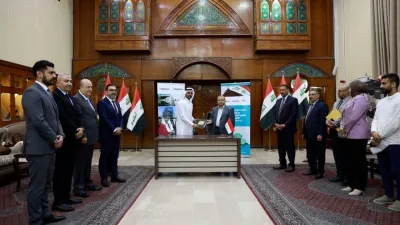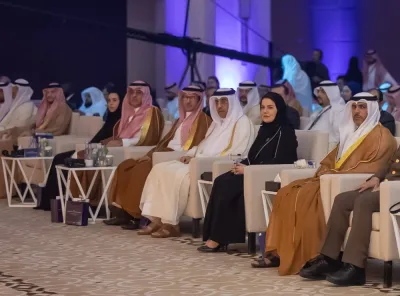*Economy minister discusses case for compensation with heads of international trade organisations in Geneva
*Defence minister says Doha could take its case before the World Court
*Defence minister says Doha could take its case before the World Court
Qatar is considering legal action demanding compensation for losses incurred owing to the ongoing blockade imposed by Saudi Arabia and its allies.
Minister of Economy and Commerce, HE Ahmed bin Jassim al- Thani, met on Tuesday the heads of international trade organisations in Geneva, Switzerland, to discuss the case for compensation.
Qatar has contracted a specialised legal team to study the actions taken by the blockading countries against it, according to a statement from the economy ministry.
Separately, Minister of State for Defence HE Dr Khalid bin Mohammed al-Attiyah said the country may even take its case to the International Court of Justice (ICJ), also known as the World Court, at The Hague.
Speaking to Turkish TRT channel, al -Attiyah added Qatar is facing a similar situation to that of Nicaragua in the eighties, when the latter sought the ICJ and gained full compensation for what happened.
On how the current crisis broke out, the Minister of State for Defence said that the current crisis has its roots in 1996 and noted that back then it was nastier and more like a hard coup. He said Qatar faced similar circumstances in 2013 and 2014.
"I'm sure by now everyone knows what happened then. But the only thing they don't know is that all the accusations against Qatar and the Emir of Qatar that he is taking a policy which is against the GCC, this is not true".
The Minister of State for Defence said that terrorism was the joint enemy of the region, and the US was the common ally in counter-terrorism efforts.
Other than the import of food and other goods through the only land border with Saudi Arabia, several businesses have also been disrupted, including the country's national flag carrier Qatar Airways, whose flights to Saudi Arabia, the UAE, Egypt and Bahrain remain suspended.
The development comes a day after Qatar officials said the government was considering "legal measures" locally and internationally over the alleged hacking of the state news agency.
Speaking to Al Jazeera on Tuesday, Marwan Kabalan of the Doha Institute said that over the past weeks, Qatar has been trying to use "different tools to undermine the blockade".
The "balance of power" within the Gulf region is now "tilting towards Qatar", particularly after the Washington Post revelation of UAE's role in the hacking that precipitated the crisis.
With the Gulf crisis entering its eighth week, however, there is no sign of the dispute being resolved soon.
Saudi Arabia, the UAE, Bahrain and Egypt imposed a land, sea and air blockade on Qatar on June 5. The quartet accuse Qatar of funding "terrorism", an accusation Qatar rejects as "baseless".
Kuwait is trying to mediate in the dispute, and countries such as the US and France have urged the parties to engage in direct talks.
Qatar and several countries have called for the lifting of the sanctions before face-to-face talks can proceed.
Daniel Hannan, a Conservative British member of the European Parliament who visited Qatar on Monday, said the continuing blockade on Qatar is not helpful in resolving the crisis.
"There is almost no situation in the world that isn't made worse by an economic blockade," Hannan told Al Jazeera.
Minister of Economy and Commerce, HE Ahmed bin Jassim al- Thani, met on Tuesday the heads of international trade organisations in Geneva, Switzerland, to discuss the case for compensation.
Qatar has contracted a specialised legal team to study the actions taken by the blockading countries against it, according to a statement from the economy ministry.
Separately, Minister of State for Defence HE Dr Khalid bin Mohammed al-Attiyah said the country may even take its case to the International Court of Justice (ICJ), also known as the World Court, at The Hague.
Speaking to Turkish TRT channel, al -Attiyah added Qatar is facing a similar situation to that of Nicaragua in the eighties, when the latter sought the ICJ and gained full compensation for what happened.
On how the current crisis broke out, the Minister of State for Defence said that the current crisis has its roots in 1996 and noted that back then it was nastier and more like a hard coup. He said Qatar faced similar circumstances in 2013 and 2014.
"I'm sure by now everyone knows what happened then. But the only thing they don't know is that all the accusations against Qatar and the Emir of Qatar that he is taking a policy which is against the GCC, this is not true".
The Minister of State for Defence said that terrorism was the joint enemy of the region, and the US was the common ally in counter-terrorism efforts.
Other than the import of food and other goods through the only land border with Saudi Arabia, several businesses have also been disrupted, including the country's national flag carrier Qatar Airways, whose flights to Saudi Arabia, the UAE, Egypt and Bahrain remain suspended.
The development comes a day after Qatar officials said the government was considering "legal measures" locally and internationally over the alleged hacking of the state news agency.
Speaking to Al Jazeera on Tuesday, Marwan Kabalan of the Doha Institute said that over the past weeks, Qatar has been trying to use "different tools to undermine the blockade".
The "balance of power" within the Gulf region is now "tilting towards Qatar", particularly after the Washington Post revelation of UAE's role in the hacking that precipitated the crisis.
With the Gulf crisis entering its eighth week, however, there is no sign of the dispute being resolved soon.
Saudi Arabia, the UAE, Bahrain and Egypt imposed a land, sea and air blockade on Qatar on June 5. The quartet accuse Qatar of funding "terrorism", an accusation Qatar rejects as "baseless".
Kuwait is trying to mediate in the dispute, and countries such as the US and France have urged the parties to engage in direct talks.
Qatar and several countries have called for the lifting of the sanctions before face-to-face talks can proceed.
Daniel Hannan, a Conservative British member of the European Parliament who visited Qatar on Monday, said the continuing blockade on Qatar is not helpful in resolving the crisis.
"There is almost no situation in the world that isn't made worse by an economic blockade," Hannan told Al Jazeera.



